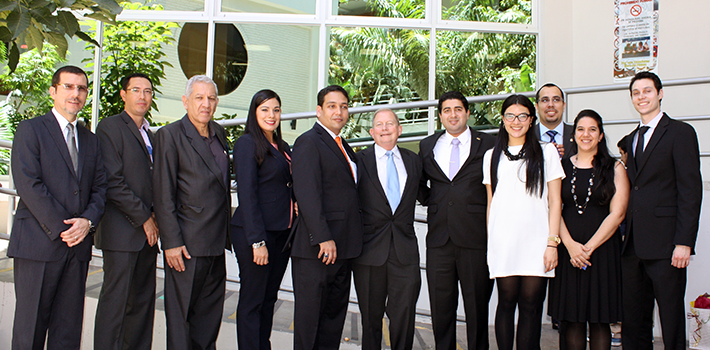
EspañolHonduras may be well positioned to become a forerunner on strategic planning and management in Latin America. On Wednesday, August 19, the Association for Strategic Planning (ASP) launched their first international chapter to a worldwide audience with a conference in Tegucigalpa, Honduras.
The event was held at the Central American Technological University (UNITEC), and began with a welcome message from the chair of the ASP International Committee, Ahmed Samy, who congratulated the Honduran chapter and described the process that led to its establishment.
The committee was created in October 2014 to position ASP globally. One of their goals is to launch five international ASP chapters by the end of 2015. The Honduran branch is the first to go live.
ASP Honduras President Alejandro Paredes led the International Chapter Council, a subcommittee involved in the development of international chapter policies that will be applicable to all regions going forward in expansion efforts.
Paredes, who tells the PanAm Post that he was the first certified strategist in Latin America, invites professionals in Latin America to reach out to ASP Honduras for support in establishing chapters in their own countries.
“The goal is for each Latin American country to have their own ASP chapter,” he says. “I invite professionals in other Latin American countries to follow Honduras’s example; ASP Honduras can help them navigate requirements and promote collaboration efforts so that we can learn from each others’ best practices.”
ASP’s international president, Lee Crumbaugh, was the keynote speaker at the event. After leading his conference on “Why strategies fail … and how to make them work,” Crumbaugh tells the PanAm Post that the expansion vision is “unlimited,” and that ASP International encourages interested individuals in any country to “connect with the International Committee or the ASP office and express that interest.”
He adds that the nonprofit organization does not have the resources to reach out to each country directly, however “if they have an interest, we’ll figure out how to make it work.”

Following Crumbaugh’s conference, ASP Honduras invited Efraín Correa, director for the Presidential Office for Strategic Planning, Budget and Public Investment, to share his thoughts on ASP’s newly launched initiative in Honduras.
He told the crowd that strategic planning is “very productive and useful,” not only in corporate applications, but also in reaching goals within government, such as poverty reduction efforts, improving health and educational indicators, and everything implied in national planning.
Correa thanked and congratulated ASP Honduras on behalf of President Juan Orlando Hernández and said the government “completely agrees with this initiative and is willing to work with [the organization] as much as possible.”
Crumbaugh says he is impressed with the Honduran government’s support: “I have been so pleased to see the partnership that our Honduras chapter of ASP is developing with the universities and the government.… The compliment goes to Honduras, not necessarily to ASP, so congratulations to Alejandro and his other board members for stepping up and making this happen.”
The ASP International president also says he has a proposal in process to help the Honduran government on a formal basis.
“If agreed upon, we would — through the chapter — introduce international ASP members with expertise to help the government set up the process of planning and performance measurement.”
The next step for ASP Honduras is to increase their membership base. Up to now, Paredes has been working within a 16-member steering committee.
He describes this steering committee as inclusive and diverse, with backgrounds ranging from recent college graduates and young professionals holding master’s degrees, to older professionals with much more experience under their belts. These professionals work within the government, in local and international NGOs, the private sector, and international cooperation entities.
Paredes says he wants to see ASP Honduras’s membership grow, so members can develop strategic thinking, since strategy in Honduras — although somewhat present — is limited to use in corporations, and not on personal, professional levels.
“These two should go hand in hand. The goal is to develop this type of thinking at a professional level and to learn about the wide array of planning and strategy tools available, aside from the SWOT analysis which is widely used here, sometimes exclusively.”
Both Crumbaugh and Paredes highlighted the need for innovation to go hand in hand with strategic planning in Honduras.
“Simply put, planning is being able to foresee problems that might arise along the way,” Paredes says. “So while we face crisis and uncertainty in the country, strategic planning goes along with innovation and creativity naturally.… There needs to be an innovative strategic mentality to come up with solutions nobody has thought of before.”
 Versión Español
Versión Español












